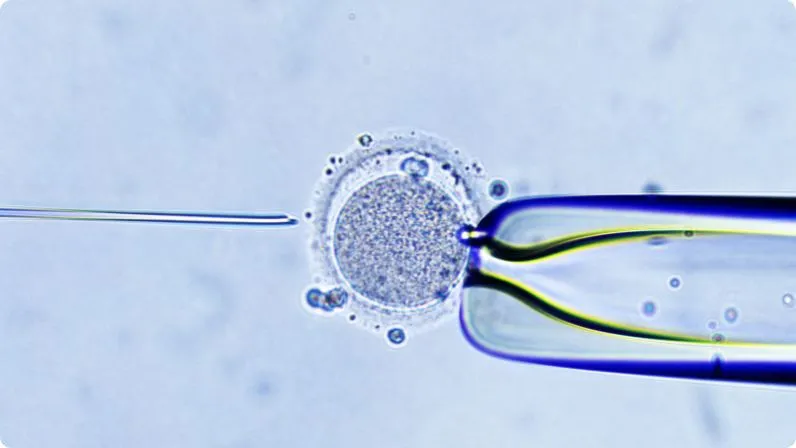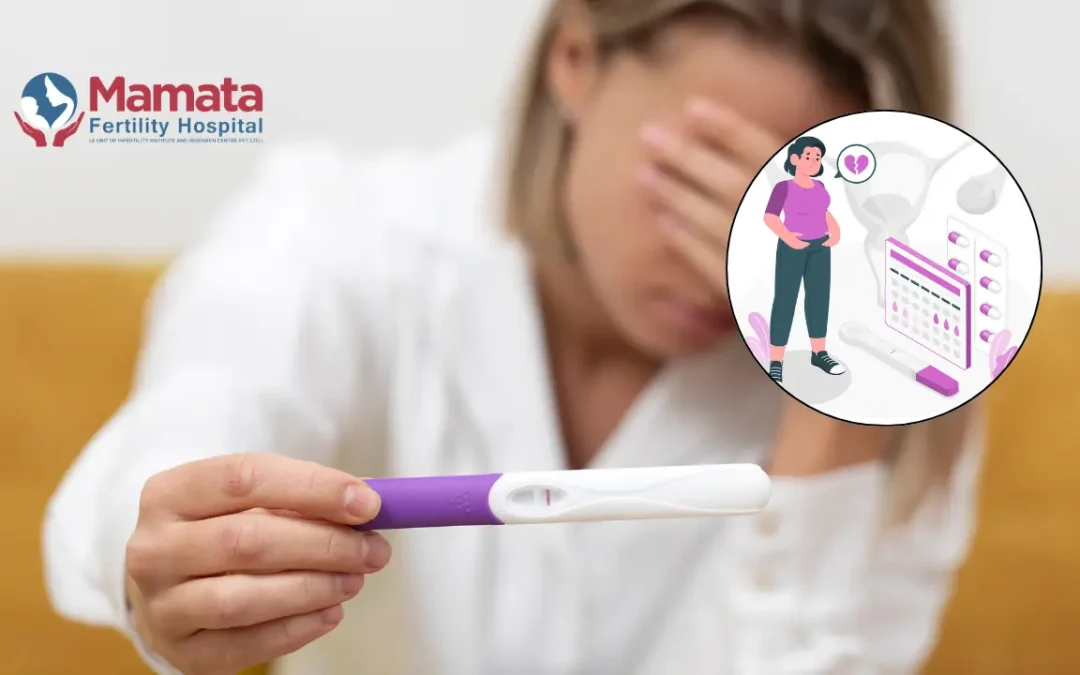High DNA Fragmentation Index (High DFI)
At Mamata Fertility Hospital in Secunderabad, we understand how challenging the journey to parenthood can be, especially when fertility issues arise. One lesser-known but crucial factor in male infertility is high DNA fragmentation index (DFI) in sperm. High DFI can affect your ability to conceive naturally or through assisted reproductive techniques, but there are ways to address and overcome it.
This article aims to provide a detailed and logical understanding of what high DFI is, its causes, signs, diagnostic methods, and available treatments.
For Appointments, Please Call:
More On Azoospermia
What is High DNA Fragmentation Index (DFI)?
To understand DFI, it helps to first understand what DNA in sperm does. DNA carries genetic instructions for the development of a baby. Each sperm contains DNA in its head, and this genetic material combines with the egg’s DNA during fertilization to form an embryo.
When the DNA in sperm is damaged or “fragmented,” it can create problems. A high DNA fragmentation index means that a significant proportion of sperm in a sample have broken or damaged DNA.
Why is High DFI a Concern?
While a sperm with broken DNA might still fertilize an egg, the resulting embryo may struggle to develop. Damaged DNA is often associated with:
- Failed fertilization.
- Poor embryo quality.
- Higher chances of miscarriage.
High DFI is sometimes responsible for unexplained infertility or repeated miscarriages. Understanding and addressing this issue can increase the likelihood of a successful pregnancy.
What Counts as a High DFI?
DFI levels are categorized as follows:
- Below 15%: Normal DNA integrity.
- Between 15–30%: Moderate fragmentation. Fertility is not severely affected, but chances of difficulties increase.
- Above 30%: High fragmentation. Natural conception is unlikely without intervention.
Although high DFI can seem like a major fertility challenge, there are many treatments and techniques to improve or bypass its effects.

Risk Factors for High DFI
A combination of lifestyle, environmental, and medical factors can contribute to high DNA fragmentation in sperm. Damage to sperm DNA often occurs during production in the testes or as they travel through the male reproductive system.
Common Risk Factors
- Oxidative Stress: This is the most common cause of DNA fragmentation. It occurs when harmful molecules called free radicals outnumber the antioxidants in your body. Free radicals can attack and damage sperm DNA.
- Age: Sperm quality tends to decline with age, especially after 40, leading to higher likelihood of DNA fragmentation.
- Lifestyle Choices: Smoking, drinking alcohol, and using recreational drugs can introduce toxins into your body that harm sperm and increase DNA fragmentation.
- High Heat Exposure: Sperm development is highly sensitive to heat. Prolonged exposure to high temperatures—like from hot tubs, saunas, or tight clothing—can lead to DNA damage.
- Exposure to Toxins: Contact with pesticides, heavy metals, industrial chemicals, or air pollution can damage sperm DNA.
- Medical Conditions:
-
-
- Varicocele: Swollen veins in the scrotum can raise scrotal temperature and disrupt sperm production.
- Chronic Health Issues: Obesity, diabetes, and other diseases can weaken sperm health.
- Reproductive Tract Infections: Sexually transmitted infections (STIs) or other infections can damage sperm as they develop.
- Varicocele: Swollen veins in the scrotum can raise scrotal temperature and disrupt sperm production.
-
-
- Cancer Treatments: Chemotherapy and radiation are known to harm sperm DNA, often increasing fragmentation levels.
- Poor Diet: A lack of key nutrients, like vitamins and antioxidants, increases susceptibility to oxidative stress and DNA damage.
- Frequent Ejaculation: Without giving the body time to purify and repair sperm, frequent ejaculation can result in lower-quality, fragmented DNA.
Understanding these factors can help you and your doctor identify areas to improve for reducing DFI.
Signs and Symptoms of High DFI
High DNA fragmentation in sperm doesn’t show direct symptoms. Instead, you might notice its effects on your fertility. Common signs that high DFI may be affecting you include:
- Difficulty Conceiving Naturally: Numerous failed attempts to achieve pregnancy after over a year of regular, unprotected intercourse could be linked to high DFI.
- Early Pregnancy Loss: Sperm DNA damage increases the risk of miscarriage, often during the first trimester, because the genetic material is critical for the embryo’s development.
- Unsuccessful Fertility Treatments: High fragmentation can reduce success rates in IVF and other assisted reproductive technologies due to poor embryo quality or failure to implant.
If you’re experiencing infertility without a clear reason or after repeated miscarriages, testing for DFI is recommended.
How is High DFI Diagnosed?
At Mamata Fertility Hospital, we use state-of-the-art diagnostic methods for identifying DNA fragmentation. These tests help us determine if DFI is affecting your fertility.
Diagnostic Steps
- Assessment of Medical History
Doctors start by reviewing your lifestyle, medical history, and known risk factors, such as smoking or exposure to environmental toxins.
- Standard Semen Analysis
A semen analysis provides information about sperm count, movement (motility), and shape (morphology). While this can reveal basic sperm health, it doesn’t measure DNA fragmentation.
- Specialized DNA Fragmentation Testing
Advanced tests give an accurate measurement of DFI levels:
-
- SCSA (Sperm Chromatin Structure Assay): Uses fluorescent dye to assess DNA damage.
- TUNEL Assay: Directly measures the breaks in DNA strands.
- Comet Assay: Shows the extent of fragmentation, helping identify how severe the issue is.
This critical data helps create tailored treatment plans for higher chances of success in conception.
Treatment for High DNA Fragmentation Index (DFI)
High DNA fragmentation index in sperm can feel like a big challenge, but the good news is that there are proven treatments to improve sperm health and increase your chances of successful conception. The treatment plan depends on the underlying causes and the severity of DNA damage, but here’s a structured look at the options available:
1. Lifestyle Changes
Lifestyle adjustments can have a significant impact on sperm DNA quality by reducing oxidative stress and improving the overall environment for sperm development.
- Quit Smoking and Limit Alcohol Consumption: Both habits introduce toxins into your body that damage sperm DNA. By quitting, you reduce oxidative stress and improve reproductive health.
- Adopt a Nutrient-Rich Diet: Focus on foods high in antioxidants since they protect cells from damage. Examples include:
- Citrus fruits, strawberries, and bell peppers (rich in Vitamin C).
- Almonds, sunflower seeds, and spinach (packed with Vitamin E).
- Fatty fish like salmon or walnuts (sources of Omega-3 fatty acids).
- Exercise Moderately: Regular moderate exercise improves blood flow and reduces oxidative stress. However, avoid overtraining as it can produce free radicals that worsen DNA fragmentation.
- Avoid Heat Exposure: Keep the testes cool by ditching tight clothing and avoiding hot tubs or saunas, as high temperatures impair sperm production and increase DNA damage.
- Stress Management: Chronic stress affects hormones that regulate sperm quality. Techniques like yoga, meditation, or deep breathing exercises help lower stress levels and benefit sperm health.
Lifestyle changes may take about 3–6 months to show noticeable improvements, as this is the approximate time it takes for sperm to regenerate fully.
2. Antioxidant Therapy
Oxidative stress is the primary cause of DNA fragmentation, so antioxidant therapy is a staple treatment. Antioxidants neutralize free radicals, protecting sperm DNA and improving integrity. Common antioxidant supplements for high DFI include:
- Coenzyme Q10 (CoQ10): This antioxidant improves sperm function and reduces DNA damage by lowering oxidative stress.
- Vitamins C and E: These are powerful antioxidants that protect sperm from cellular damage caused by free radicals.
- L-Carnitine: Known to help boost sperm motility and energy while protecting against DNA fragmentation.
- Zinc and Selenium: Essential minerals that reduce oxidative stress and support healthy sperm production.
Doctors typically recommend starting these supplements based on your specific needs. It’s important to take them consistently for 3–6 months to allow sperm regeneration and improvement in DNA integrity.
3. Medical Treatments
If a medical condition is contributing to high DFI, treating the underlying issue can significantly improve sperm health. Here are some possible options:
- Varicocele Repair Surgery: Varicocele, or enlarged veins in the scrotum, can increase scrotal temperature and oxidative stress. A minor surgery to repair varicoceles helps lower heat exposure and improve both sperm production and DNA quality.
- Antibiotics for Infections: If a reproductive tract infection is damaging sperm, treating it with antibiotics can help reduce inflammation and DNA fragmentation.
- Hormonal Therapy: Hormonal imbalances may be corrected using medications to improve sperm development and overall DNA quality.
Consulting a fertility specialist to evaluate medical conditions is essential for identifying whether these treatments are suitable for you.
4. Advanced Fertility Techniques
For men with severe DNA fragmentation or when other treatments do not lower DFI enough, advanced fertility techniques can bypass the challenges and increase success rates:
- Intracytoplasmic Sperm Injection (ICSI): This technique involves injecting a single, healthy-looking sperm directly into the egg during in vitro fertilization (IVF). Even if some sperm have fragmented DNA, ICSI ensures better chances of fertilization and embryo development.
- Sperm Selection Techniques (PICSI or IMSI): These methods use advanced microscopes or biochemical tools to select the healthiest sperm with the lowest DNA fragmentation for fertilization, ensuring the best-quality sperm are used.
- Sperm Washing: Specialized techniques separate damaged sperm from healthier ones, making the sample more suitable for assisted reproductive technologies like IVF or intrauterine insemination (IUI).
5. Sperm Freezing
For men planning to undergo treatments like chemotherapy or radiation, which can worsen DNA fragmentation, freezing healthy sperm beforehand is an excellent option. Preserved sperm can later be used for fertility treatment when you are ready to conceive.
Tailored and Combined Treatment Plans
Often, the most effective approach combines lifestyle changes, antioxidant therapy, and advanced medical interventions. Treatment plans are tailored to your specific needs and may adjust over time based on progress and new findings during diagnostic follow-ups.
Final Thoughts
Choosing the right treatment starts with understanding the cause of high DFI. At Mamata Fertility Hospital, our experts will guide you through personalized treatment plans to improve sperm DNA integrity and maximize your chances of successful conception. Reach out today to take the first steps toward better fertility!
Frequently Asked Questions (FAQs)
1. Can high DFI levels be improved?
Yes, with lifestyle changes, antioxidant therapy, and addressing medical issues, DFI levels can significantly decrease.
2. Will high DFI make it impossible to have children?
No! Many men with high DFI become fathers, either through natural conception or advanced fertility treatments.
3. How long does it take to improve DFI?
It usually takes 3–6 months of consistent lifestyle changes and antioxidant therapy for noticeable improvements since sperm take about 74 days to regenerate.
4. Are advanced fertility techniques like ICSI safe?
Yes, techniques like ICSI are highly safe and effective for overcoming male infertility caused by high DFI.
At Mamata Fertility Hospital, we specialize in diagnosing and treating issues like high DFI to help you achieve your goal of parenthood. If you suspect DNA fragmentation may be affecting your fertility, contact us to schedule a consultation. Together, we’ll find the best path forward for your family.
Reviewd By

Dr Aarti Deenadayal Tolani
Clinical Director, Scientific In-Charge & Fertility Consultant
MBBS, MS ( OBGYN), FICOG
Expert in Reproductive Endocrinology, Infertility, Advanced Gynaec Ultrasound, and Faculty at Mamata Fertility Hospital.
Blogs and Articles

No Period After IUI But Negative Pregnancy Test: What It Means
Home > Blogs > No Period After IUI But Negative Pregnancy TestNo Period After IUI But Negative Pregnancy Test: What It MeansNo Period After IUI But Negative Pregnancy Test Experiencing a delay in your period following Intrauterine Insemination (IUI) coupled with...

Does Health Insurance Cover IVF Treatment in India?
Does Health Insurance Cover IVF Treatment in India? -The cost of IVF treatment is a significant concern for many couples struggling with infertility. While IVF offers hope for parenthood, the financial burden can often feel overwhelming. A common question that arises...

When Should I Expect My Period After IUI? | Fertility Specialist
Home > Blogs > Best Follicle Size for IUI PregnancyWhen Should I Expect My Period After IUI? | Fertility SpecialistWhen to Expect Your Period After IUI Intrauterine Insemination (IUI) is a fertility treatment that involves placing sperm directly into a woman’s...
RELATED CONDITIONS
- Low Testosterone
- Low Sperm Count (Oligospermia)
- Low Sperm Morphology
- Semen Infections
- Small Testis
- When to Consult Infertility Specialist?

